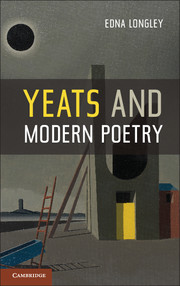Book contents
- Frontmatter
- Dedication
- Contents
- Preface
- Acknowledgements
- List of Abbreviations
- Chapter 1 Ireland as Audience: ‘To write for my own race’
- Chapter 2 Yeats and American Modernism
- Chapter 3 Intricate Trees: The Survival of Symbolism
- Chapter 4 ‘Monstrous familiar images’: Poetry and War, 1914–1923
- Chapter 5 Yeats’s Other Island
- Postscript
- Notes
- Index
Chapter 2 - Yeats and American Modernism
Published online by Cambridge University Press: 05 June 2014
- Frontmatter
- Dedication
- Contents
- Preface
- Acknowledgements
- List of Abbreviations
- Chapter 1 Ireland as Audience: ‘To write for my own race’
- Chapter 2 Yeats and American Modernism
- Chapter 3 Intricate Trees: The Survival of Symbolism
- Chapter 4 ‘Monstrous familiar images’: Poetry and War, 1914–1923
- Chapter 5 Yeats’s Other Island
- Postscript
- Notes
- Index
Summary
The biases of Yeats’s Oxford Book of Modern Verse can appear simply mad or mischievous. Having omitted Wilfred Owen, Yeats professes himself ‘excited’ by Lady Dorothy Wellesley, and calls the Irish versifier Oliver St John Gogarty ‘one of the great lyric poets of our age’ (OBMV xxxiii, xv). Although Austin Clarke’s absence annoyed (and still annoys) the Irish, the anthology abounds in minor Revival poets. Outraged by Yeats’s attitude to Owen, Stephen Spender spoke for England: ‘All Mr Yeats’s geese have to be swans, especially if they happen to have been born in Ireland.’ Further, since T.S. Eliot and Ezra Pound were the only Americans to make the cut, and did so on the grounds that ‘long residence in Europe [has made them] seem to English readers a part of their own literature’ (xlii), Babette Deutsch spoke for America: ‘It is not representative of the development of modern poetry.... Here is a collection of “modern verse” that ignores ... Robert Frost, Vachel Lindsay, Hart Crane, E.E. Cummings ... while ample space is assigned to lesser verse-makers who happen to be natives of the British Isles.’ Or, as a subeditor headed her review: ‘His Choices for This Anthology Are Surprising. He Likes the Irish and Omits America’.
Even so, the Oxford Book of Modern Verse illuminates Yeats’s presence in ‘modern poetry’. The editorial work recharged his historical and critical self-consciousness, testing long-held principles, raising the issue of ‘legacy’ and deepening the reflexivity of his later poems: ‘Lapis Lazuli’ (1936) is discussed below. Thinking about poetry ‘from three years before the death of Tennyson to the present moment’ (1892–1935) obliged Yeats to configure the 1890s with the 1930s; to juxtapose his poetic past and present; and hence to grasp his own modernity: ‘Even a long-lived man has the right to call his own contemporaries modern’ (OBMV v). Having praised the generation of Louis MacNeice and W.H. Auden (both born in 1907) for being ‘modern through the character of their intellectual passion’, Yeats declares: ‘[I]n this moment of sympathy I prefer them to Eliot, to myself: I too have tried to be modern’ (see Chapter 5).
- Type
- Chapter
- Information
- Yeats and Modern Poetry , pp. 34 - 67Publisher: Cambridge University PressPrint publication year: 2013



